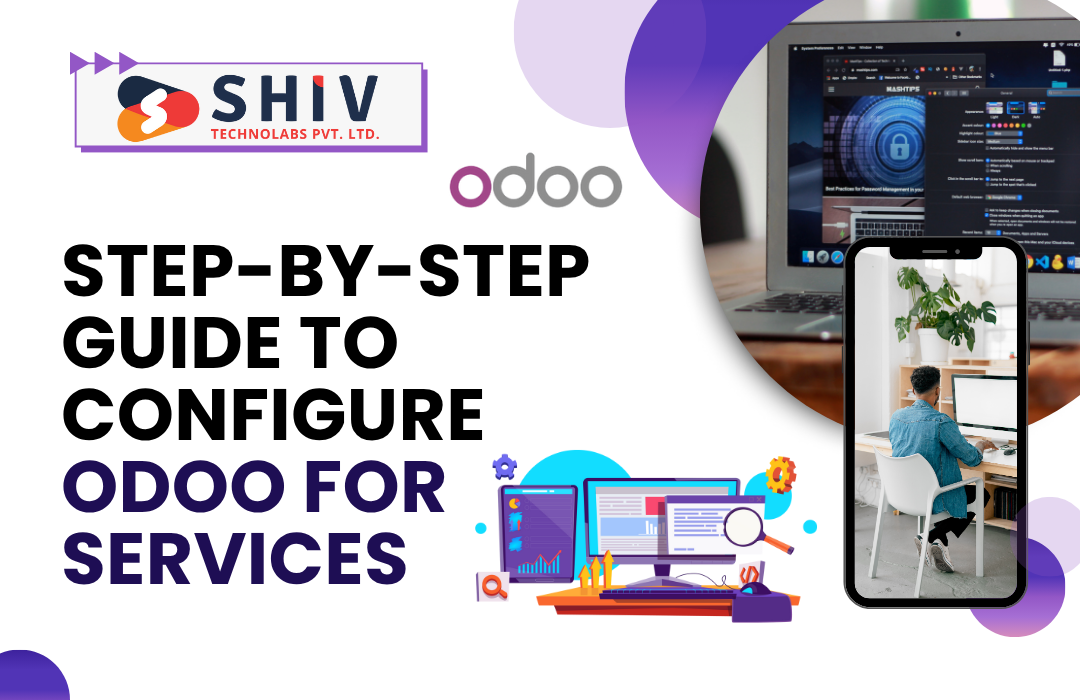Setting up the right tools is important for service-based businesses. Unlike product sellers, service providers need flexible systems to han...
Our focus is on Odoo ERP Customization Services, and this guide helps you get the most out of your Odoo setup without any confusion.
Why Service-Based Businesses Prefer Odoo
Odoo gives you modules that cover everything from CRM and project tracking to invoicing and reports. It's modular, so you can install only what you need. Businesses that offer consulting, maintenance, education, digital marketing, healthcare, or training benefit most from these features.
Odoo works well for service models like:
- Hourly billing based on timesheets
- Fixed-fee projects with milestones
- Subscription-based service delivery
- Field service and ticket-based support
Step-by-Step Guide to Configure Odoo for Services
Step 1: Select the Right Odoo Edition for Service Business
Choose between Odoo Community and Odoo Enterprise. Enterprise supports advanced features like reporting, access controls, and simple UI customization. For long-term use, Enterprise is better suited for service-based companies.
Step 2: Choose “Services” During Initial Setup
During onboarding, select “Services” as the primary industry. This setting helps auto-load key modules related to projects, billing, and client communication.
Step 3: Add Modules Required for Service Delivery
From the Odoo Apps section, add essential modules such as:
- CRM – Lead tracking
- Sales – Service quotations
- Project – Task and project timelines
- Timesheet – Hour tracking
- Invoicing – Billing and payments
- Helpdesk – Ticket-based client support
- Studio – (only in Enterprise) to make changes without code
Step 4: Create Service Products for Client Billing
- Go to Sales → Products → Create
- Set product type as “Service”
- Select how you want to charge: fixed fee or hourly
- Add tax details, internal tags, and a public label
Step 5: Build Projects Based on Client Deliverables
Use the Project module to create one project per client or contract. Add tasks, define stages, assign staff, and set billing rules per task.
Step 6: Track Time with Timesheets for Accurate Billing
Activate timesheet logging under Project settings. Allow staff to add hours against tasks. Link those logs to invoices automatically.
Step 7: Manage Service Quotes and Orders with Sales App
Create quotations, set terms, and send service agreements through the Sales app. Convert accepted quotes into projects.
Step 8: Automate Invoicing from Timesheets or Fixed Plans
Use the Invoicing module to send bills. Set up one-time or recurring plans. Payment options like Stripe and PayPal can be added.
Step 9: Review Reports on Team Output and Revenue
Access reports showing hours worked, tasks completed, invoices sent, and revenue by client. Use filters to track what matters to your business.
Also read: AI-Powered Inventory Management in Odoo: Benefits, Techniques & Use Cases
Optional Add-Ons to Extend Your Setup
1. Helpdesk Module
If you offer client support, the Helpdesk module lets customers raise tickets. Each ticket can be assigned to a service agent and tracked until it's resolved.
2. Appointment Scheduling
For coaching, legal services, or consulting, use the Calendar module with appointment booking. Let clients pick time slots and reduce manual coordination.
3. Website & Online Forms
You can build a basic services site using Odoo Website. Add inquiry forms that link directly to your CRM.
Also read: How to Successfully Launch Your eCommerce App in 2025
Mistakes to Avoid When Configuring Odoo
- Treating services like physical products – Always select the right product type
- Not using timesheets – It leads to missed billing opportunities
- Skipping user roles – This causes data access issues and confusion
- Not testing invoicing – Mistakes here damage client trust
- Ignoring module updates – You might miss new features and bug fixes
Estimated Cost of Configuring Odoo for Service-Based Businesses
Every business has different needs. Here’s a basic pricing guide based on the number of modules and the level of customization:
Service Scope | Estimated Time (Hours) | Estimated Cost (USD) |
Basic Configuration (CRM, Invoicing, Timesheet) | 20 | $800 - $1200 |
Mid-Level Setup (CRM, Projects, Invoicing, Timesheet, Custom Reports) | 40 | $1600 - $2400 |
Advanced Setup (Custom Modules, Multi-company, Integrations) | 80 | $3200 - $4800 |
These are rough estimates. Actual cost depends on your business flow, integrations, and custom reporting needs.
Also read: How Odoo ERP Helps You Manage eCommerce Operations Better
Conclusion
Odoo is a smart pick for service businesses looking to grow. Its modular system gives you control over client work, project timelines, and billing. But to make it work for your business, you need the right configuration. That’s where Odoo ERP Customization Services come in—ensuring every module aligns with your workflow and billing method. From tracking every hour to generating invoices on time, Odoo makes it possible—but only if you set it up the right way.
Odoo ERP Customization Services by Shiv Technolabs
At Shiv Technolabs, we help service-based businesses get the most out of Odoo with tailored ERP solutions. Our team understands that every service workflow is different—so we set up your Odoo system to match how you work, not the other way around.
What We Offer:
- Full Odoo setup for service-based operations
- Module installation: CRM, Sales, Projects, Timesheets, Invoicing
- Role-based user configuration and access
- Timesheet-based billing and invoice automation
- Custom dashboards and report views
- Integration with third-party tools (e.g., payment gateways, helpdesk)
- Ongoing support and system upgrades
Whether you're moving from spreadsheets or switching from another ERP, we’ll help you stay on track—fast and cost-effectively.
Ready to configure your Odoo ERP the right way? Contact us today.




No comments